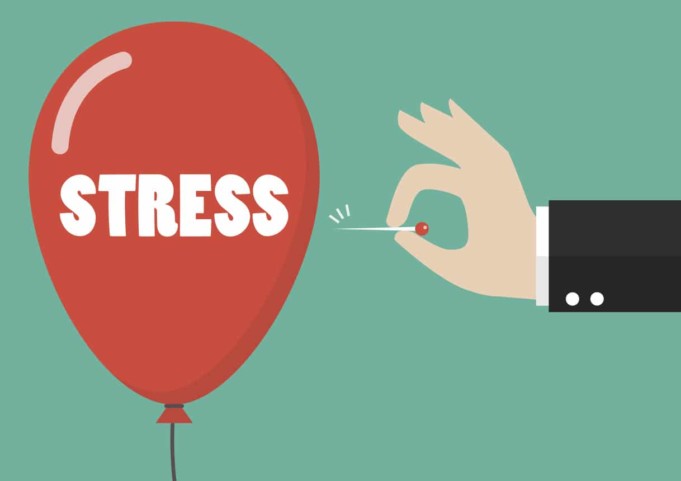Stress is the natural way the body responds to threats or any type of demand; when the body senses a real or imagined danger, the defense system of the body kicks into a rapid and automatic response in high gear.
This automatic process is known as the “stress response” or the “fight-or-flight” reaction. This is a means of protection carried out by the body, it motivates you and helps you perform under pressure. It keeps you alert, focused and energized and helps you do your best.
When you are under stress, your nervous system will release lots of stress hormones, cortisol, and adrenaline. This prepares the body for emergency action, your muscles tighten, your heartbeat increases, your senses become sharper, your breath becomes faster, and your blood pressure rises.
These physical changes are triggered to increase your stamina and strength, it aims to speed up your reaction time. This can save your life in emergency situations and bestow you with extraordinary strength for defense. This defense mechanism helps you cope with challenges but it has to be on a minimal level. Being under stress for a long period of time (chronic stress) is harmful and causes lots of damages in the body.
Causes of Stress
There are many stressors (situations or things that cause stress), they put high demands on you. The causes of stress are:
- Family and children
- Pessimism
- Major changes in life
- Inflexibility and rigid thinking
- Working for long hours or too much responsibilities
- Negative self-talk
- School or work
- All-or-nothing attitude
- Unhappiness in jobs or life
- Relationship difficulties
- Working under dangerous conditions
- Inability to accept uncertainty
- Too busy
- Unrealistic expectations
- Financial problems
- Divorce or death of a spouse
- Retirement or carrier change
- Imprisonment
- Marriage and marriage reconciliation
- Death of a loved one or a family member
- Injury, accident or an illness
- Job loss or eviction from home
Effects of Chronic Stress on the Body
When the body is under chronic stress, the immune system deprives other system of energy and channels all the energy to the flight-or-fight response. There will be no energy left for the heart, the reproductive system or digestion.
When these happen, the muscles become tense. Muscle tension occurs to protect the body from injuries and pains. When the muscles are tensed for a long time due to chronic stress, this can lead to migraines, tension-headache, and pains in the neck and head.
This can cause musculoskeletal disorders, it also affects the respiratory system and makes breathing difficult. This can trigger asthmatic attacks and other respiratory problems. It also causes rapid breathing and panic attacks.
Chronic stress affects the heart and blood vessels. The constant rapid heartbeat and high levels of stress hormones and increased blood pressure raise the risk for cardiovascular diseases and atherosclerosis.
This can cause hypertension, stroke, and heart attack. The presence of stress hormones in the body makes the liver to produce excess glucose, this gives enough energy for the flight-or-fight response. This sugar cannot be reabsorbed in patients with type II diabetes or those vulnerable to it.
Chronic stress affects the digestive system and increases the severity of heartburn, acid reflux and GERD. It makes the brain more alert to sensations in the stomach and it affects bowel movement. It puts the nervous system in a state of constant flight-or-fight response. It affects reproduction in both males and females.
Diseases and Health Problems Caused or Worsened by Stress
Chronic stress affects every part of the body, from the brain to the digestive system. It causes lots of health problems. Chronic stress is believed to be behind many diseases and illnesses. Some of these diseases and complications are:
- cognitive and memory problems
- Depression and mental problems
- Infertility and reproductive problems
- Menstrual problems
- Sexual dysfunction
- Anxiety
- Atherosclerosis
- Weight problems
- Frequent pains
- Cardiovascular disease
- Insomnia and sleep problems
- Skin problems
- Auto-immune diseases
- Digestive problems
Signs and Symptoms that you are under Chronic Stress
One scary thing about stress is that you can get used to it and it becomes normal that you no longer notice it is taking a heavy toll on you. This warning signs can help you know when to start reducing stress or managing it effectively.
- Poor judgment
- Hypersomnia or insomnia
- Memory problems and the inability to concentrate
- Nervous habits and eating disorders
- Constant worrying and negative thoughts
- Withdrawal and neglecting responsibility
- Upset stomach and digestive disturbances
- Unhappiness, anxiety and depression
- Grinding teeth and clenched jaws
- Fatigue and low energy
- Difficulty quieting your mind or relaxing
- Frequent infections, colds and flus
- Agitations and irritability
- Headaches
- Low libido and sexual problems
- Anger and moodiness
- Rapid heartbeat
- Feeling overwhelmed
- Chest pain
- Emotional pain
- Aches and pains all over the body
- Nausea, vomiting and dizziness
Natural Remedies for Stress
Deep and Slow Breathing
This practice increases the levels of oxygen in your body, this helps you relax and it sends a message to your brain to calm the body. Oxygen gives a calming effect to the mind and body, and it prevents stress.
When you are stressed, sit down or lie down in a comfortable place but make sure it is quiet and free of distractions. Close your eyes and practice deep breathing through your nose. Hold your breath for five seconds before you exhale. Do this repeatedly until you are relieved.
Kava Root
 This is an effective remedy for stress and anxiety. It calms a racing mind and relieves symptoms of stress. It aids quality sleep, it fights restlessness and anxiety, it relieves muscle tensions and muscle spasms. It is available in capsules and liquid forms, make sure you take it according to prescription.
This is an effective remedy for stress and anxiety. It calms a racing mind and relieves symptoms of stress. It aids quality sleep, it fights restlessness and anxiety, it relieves muscle tensions and muscle spasms. It is available in capsules and liquid forms, make sure you take it according to prescription.
Ashwagandha
This help is beneficial for people who are going through chronic stress. It reduces the risk of chronic diseases and other medical conditions caused by stress. It also boosts metabolism and increases physical and mental performances which are mostly by chronic stress.
It strengthens the nervous system, it reduces the levels of stress hormones and increases the resistance of the body to stress. It even fights anxiety, boosts quality sleep and enhance the quality of life. It is available in the market and health stores as fresh roots, powder and tablet forms.
Take it according to the dosage; use one gram of the fresh or dried root to make a cup of tea three times daily. Consult with your doctor first before making use of this herb, also hypertensive patients, diabetic patients, little children and pregnant women should not take this herb.
Lemon Balm
 Lemon balm treats anxiety, moodiness, and stress. Six hundred milligrams of lemon balm every week boosts mood, it increases alertness and calms the body. it can also be taken as tea and it calms the body in a few minutes.
Lemon balm treats anxiety, moodiness, and stress. Six hundred milligrams of lemon balm every week boosts mood, it increases alertness and calms the body. it can also be taken as tea and it calms the body in a few minutes.
Green Tea
One cup of green tea is enough to relieve your stress. It is rich in polyphenols and many types of Catechins that help to relieve stress and calm the body. Green tea also contains an amino acid L-Theanine, this stimulates the production of alpha waves in the brain, which in turn, promotes relaxation and calmness. It also boosts focus, alertness and mental performance.
Valerian
 This herb is used to treat insomnia and anxiety and it is also an effective remedy for stress since these are the symptoms of stress. It promotes peacefulness and a feeling of tranquility. You can take the root powder as tea or you can take the supplements.
This herb is used to treat insomnia and anxiety and it is also an effective remedy for stress since these are the symptoms of stress. It promotes peacefulness and a feeling of tranquility. You can take the root powder as tea or you can take the supplements.
Holy Basil
 This is a well-respected herb in Ayurveda medicine. It is a strong fighter against stress and it boosts the overall health. It contains powerful phytochemicals like germacrene, oleanolic acid, elemene, ursolic acid, Linalool, rosmarinic acid, carvacrol, and eugenol.
This is a well-respected herb in Ayurveda medicine. It is a strong fighter against stress and it boosts the overall health. It contains powerful phytochemicals like germacrene, oleanolic acid, elemene, ursolic acid, Linalool, rosmarinic acid, carvacrol, and eugenol.
It boosts immunity and is one of the best known adaptogenic herbs. It enhances the natural responses of the body to both emotional and physical stress. It also helps the body function optimally when stressed. Take basil tea three times daily. You can also chew on fresh basil leaves many times daily.
Lavender
Lavender essential oil is a great stress reliever, inhaling this essential oil alone can relieve stress and makes the body calm. It also boosts mood and treats anxiety. Diffuse few drops of lavender in your room to relieve stress and help you stay alert.
Chamomile Tea
The sedative nature of this herb makes it a great therapy for stress, it calms and soothes the central nervous system, it eases anxiety, tensions and relaxes the body. It also fights insomnia and promotes a better sleep.
Take four cups of chamomile tea after a stressful day. Put two teaspoons of chamomile, in a cup of hot water and leave it for ten minutes, cover it. Strain it and add honey for taste.
Vitamin B
These vitamins (B1, B2, B3, B5, B6, B7, B9, and B12) treat stress, improve mood, they improve the functions of the brain and nervous system, they induce relaxation and calmness and fight fatigue and stress.
A deficiency of vitamin B has been linked to symptoms of stress like apathy, irritability, and depression. Eat lots of foods rich in vitamin B and they include legumes, organic eggs, and dairy, whole grains, avocados, bananas, beans, potatoes, peas, kale, peanuts, blackstrap molasses, and spinach.
Passion Flower
This is a powerful folk remedy for stress. This flower is dense in flavonoids like luteolin and apigenin, it also contains alkaloids like harmine, harmane, and harmaline. All these nutrients relive stress and have an anti-depressant effect.
It also elevates the levels of GABA in the brain. This compound fights panic attacks and stress, it also relieves anxiety as well. Take a cup of passionate tea when you are feeling stressed. Take it regularly during the day when you are under constant stress.
You can use fresh passion flower or dried ones; add a tablespoon of passion flower to one cup of hot water, cover it and allow it steep for ten minutes. Strain it and drink it when it’s warm. Passionflower is also available in a liquid extract form, tablets, and tinctures.
Exercise
Moderate exercises help to relieve stress, a thirty minutes’ walk in nature or in a gym reduces the levels of stress hormones and makes one feel good by increasing the levels of endorphins in your body. It also fights moodiness and mood swings. Try and carve out time from your busy schedule and engage in exercises like walking, swimming, dance or sports.
Massage
Body massage is an effective relief for stress, ancient Chinese used this to relieve stress, and open blocked channels of the body and boosts overall health. You can use essential oils when massaging your body, this will boost the effectiveness of the massage and hasten quick relief.
Acupuncture
This therapy treats many symptoms of stress and stress-related conditions. It treats mental problems and disorders, infertility, depression, autoimmune diseases, anxiety and other diseases that stress causes. It boosts immunity and reduces the risks of cardiovascular diseases.
Studies have proven that this is one of the best remedies for stress. It helps patients recover from heart disease because of its impact on the nervous system. It also normalizes blood pressure, the levels of hormones, circulation and boosts overall health.
Epsom Salt
Soaking in Epsom salt is an effective remedy for stress, it relaxes and calms the body. Stress depletes the levels of magnesium in the body and raises the levels of adrenaline. Epsom salt is high in magnesium and it improves mood by increasing the levels of serotonin and reduce the levels of adrenaline.
Add a cup of Epsom salt to your bath water and soak in this for at least twenty minutes. The magnesium sulfate present in this salt will be absorbed into your body, stir it thoroughly until the salt dissolves in the water before soaking in it.
Create a Positive Mindset
This boosts motivation and helps your body go through a stressful period without causing much damage.
A positive mindset controls the mind, and this, in turn, will prevent stress. Studies have linked negative thoughts to stress, so train your mind to see the positive side of things and be grateful for every little thing.
See problems as opportunities and this will control how your mind and body respond to stress. Other effective cures for stress are listening to music, laughter, talking to a loved one, sufficient sleep and a healthy and balanced nutrition.












